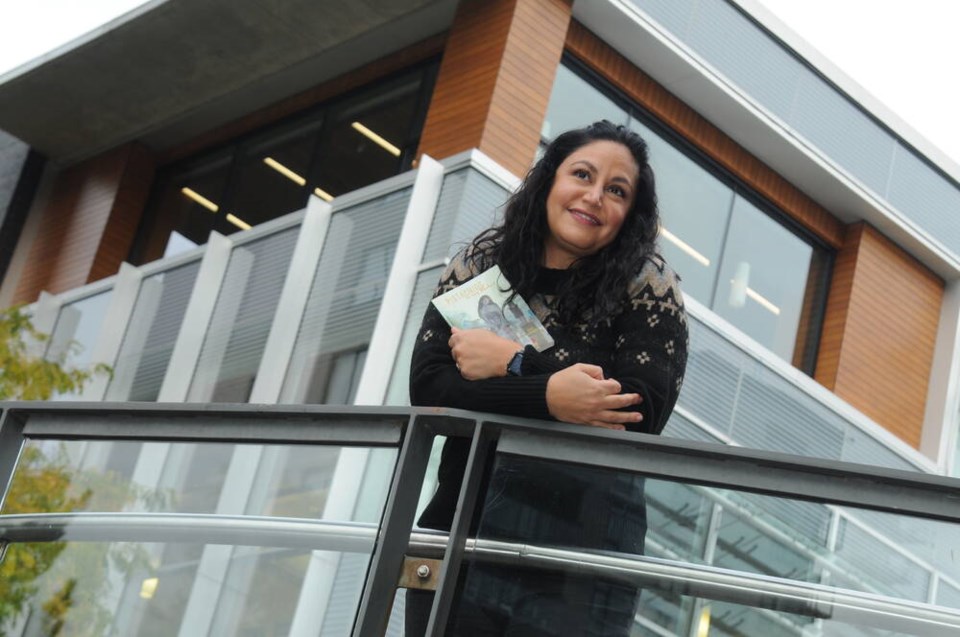After the Iranian Revolution broke out in 1979, most of the images seen by people in other countries were of terrible violence in the streets.
So how were the North Vancouverites that a three-year-old Sareh Farmand met able to connect with her and her immigrant family on such a loving and human level?
mom and grandma in their see-through rainhats
from Boots drug store
Cindy at the counter with I Dream of Jeannie hair
shows them how to wear it so their hair doesn’t get flat
This excerpt from Farmand’s poem North Vancouver, 1982 recalls one of the many memories documented in her poetry collection Pistachios in My Pocket, which was published at the end of October.
“I remember them teaching us about Canadian things with such kindness and compassion and patience – they got it,” Farmand said, adding that she quickly became fond of the Lonsdale area and other parts of the North Shore that she grew up in.
Someone said something like, “Hey, I think where you come from it probably doesn’t rain a lot. Let me show you how to wear this hat so your hair doesn’t get flat.”
While her recollections of that period are the dreamlike pockets of time typical of childhood memories, she remembers the sense of safety in coming to sa���ʴ�ý, where her aunt and uncle were already living.
oven-baked bread embraces
this cold drizzly grey day
we are not yet accustomed
we are welcome
we belong
But despite her parents’ resilience, Farmand said she also remembers their sense of loss and sadness. Apart from her own experiences, her poems also trace the memories of her mother and grandmother, who saw Iran evolve into a more progressive state – especially for women – under the rule of Shah Mohammad Reza Pahlavi.
When Farmand started writing her book in 2018, she felt there were still a lot of people who didn’t know that her mother lived in a free Iran. “She had a right to wear what she wanted, she had a right to work, she had the same status of women here in sa���ʴ�ý.
“I thought it would be interesting to give that context,” Farmand said, “to take people on a journey that began with my grandmother’s Iran and take them back in time.”
It was during her time under the mentorship of Betsy Warland at the Writer’s Studio program at SFU that loss, belonging, integration and identity emerged as major themes throughout Farmand’s work, rather than just a small part of her writing.
Through the program, instructors encourage students to start writing their manuscript.
“I had the idea to tell the story of Iran, and our story, my family’s story,” she said. “And it’s the story of sa���ʴ�ý too – the story of immigration.”
But since protests erupted in the country and around the world following the death of Mahsa Amini in September, the messages in her book have taken on another dimension.
“Me in the safety of my home on the North Shore, I’m so glad I had the courage to at least speak my truth,” Farmand said, “because look at these amazing people and what they’re doing.
“The way I see it is: I wrote this book. And now I feel like if I could use it as a platform to talk about the revolution that’s happening, to support the revolution, to support all of these brave people that are out there,” she continued.
“To me, they keep saying, ‘Please amplify our voices.’ That is what I’m using this book for.”
Farmand said she’s using upcoming events surrounding her book to continue those conversations. She’s celebrating her book launch at the Massy Arts Society in Vancouver on Dec. 1, where she’ll be discussing the book but also the fight for freedom in Iran.
A second event on Dec. 15 at West Vancouver Memorial Library will be more centred around what’s happening in Iran. Hosted by CBC’s Margaret Gallagher, Farmand will be joined by Nazli Ataeeyeh to talk about art and activism, and what it means to be Iranian-Canadian. Ataeeyeh created the illustrations for Pistachios in My Pocket, and is also an immigrant from Iran.
“When you leave a country for political reasons, you become political,” Farmand explained. Her poem motherland impresses how her country will never leave her, even though she left it.
you are held in the corners of my mind
tight crevasses of my heart
you line my lungs
and gut with microbes
found only in your geography
everything that makes me strong is born from you
so far away
I live and breathe you still
I use your love language to whisper sweetness in my babies’ ears
savoury scent of your food fills our Canadian home
your old songs, I know by heart
you
gone
yet forever remain
within around me
Iranian Poetry and Art in sa���ʴ�ý with Sareh Farmand and Nazli Ataeeyeh hosted by Margaret Gallagher
When: Thursday, Dec. 15, 6-7:30 p.m.
Where: West Vancouver Memorial Library
Cost: free.



